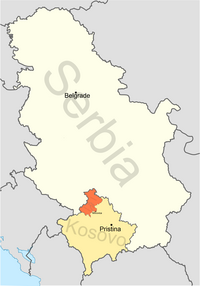North Kosovo crisis

Serb blockade of a road in North Kosovo
|
|
| Date | 25 July 2011–19 April 2013 |
|---|---|
| Location | North Kosovo |
| Type | Civil unrest |
| Cause | Republic of Kosovo's imposition of sovereignty on the whole territory of Kosovo according to Constitution of Kosovo; acquiring border posts located in North Kosovo. Local Serbs' prevention of the imposition of Republic of Kosovo-enacted decrees within North Kosovo. |
| Participants | Kosovo Force, Kosovo Police, local Serbs |
| Deaths | 3 Serbs dead, 1 Kosovo police dead, |
| Non-fatal injuries |
|
| Location of North Kosovo |  |
Clashes between ethnic Serbs in northern Kosovo and the Republic of Kosovo began on 25 July 2011 when the Kosovo Police crossed into the Serb-controlled municipalities of North Kosovo, in an attempt to control several border crossings without the consultation of either Serbia or KFOR/EULEX. Though tensions between the two sides eased somewhat after the intervention of NATO's KFOR forces, they continued to remain high amid concern from the EU. Maja Kocijancic, an EU commission spokesperson, said that Kosovo government's action was "not done in consultation neither with the European Union or the international community". The US president Barack Obama repeated Kocijancic's sentiments but didn't condemn the Kosovo government's actions. On 19 April 2013, an agreement was signed in Brussels between representatives of Kosovo and Serbia. The 15-point document granted devolved powers to North Kosovo regarding economic development, education, healthcare and urban planning, and a number of mechanisms that allowed a certain degree of autonomy in justice, policing and electoral matters.
The clashes occurred due to a long stand-off over cross-border trade. Since the declaration of independence, Kosovo has been unable to export anything to or via territories directly controlled by Serbia's government. There was disruption to cross-border trade following Serbia's ban on Kosovar imports, even though many jobs on both sides of the border depended on international trade Serbia also stationed troops in the northern region to enforce a boycott of goods from Kosovo proper.
Although KFOR had made implementation of the "vague ultimatums" to remove the barricades, Kosovar Serbs had in the past used mountainous tracts to cross between northern Kosovo and Serbia proper. At the same as the bridge dividing Mitrovica was closed from transport to the south, the daily train to southern Serbia was packed. The EU also demanded that Serbia dismantle "the parallel structures" of government in Northern Kosovo. Serbia's Secretary of State for Kosovo, Oliver Ivanović said: "We don't see these as 'parallel structures', we see these as the only structures, because we do not recognise the independence of Kosovo." He also said that a partition of Kosovo is out of the question, even though Serbian President Boris Tadić said he was open to the possibility. The Serbs of North Kosovo do not acknowledge or cooperate with the government of Kosovo.
...
Wikipedia
